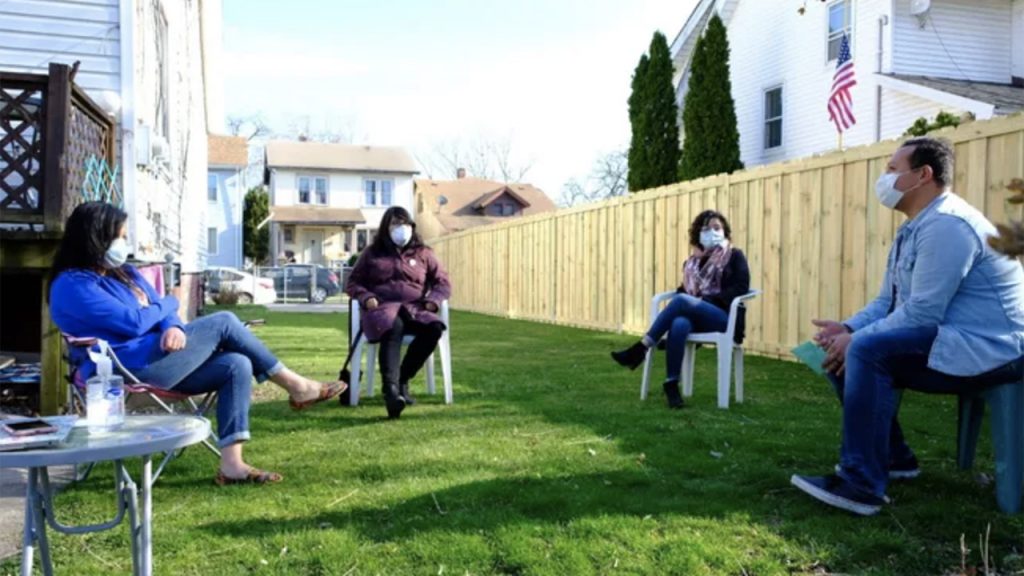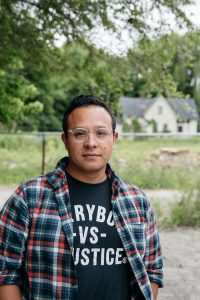Organizers launched crowdfunding campaign to offer lifeline to undocumented families in Metro Detroit during pandemic
A group of community organizers noticed undocumented immigrants weren’t receiving services that were available to other residents.

Fundraisers, Luz Viviana Meza, Maria Ibarra-Frayre, Juan Carlos Dueweke-Perez and Catalina Rios, gather before distributing funds to families in Detroit and downriver on Monday, April 6, 2020. Photo credit: Sarah Rahal/ taken for The Detroit News with permission for republication.
“Communities of Hope” features Detroiters from communities of color who have been looking for ways to persevere during the pandemic.
In the early days of the pandemic, many undocumented workers suddenly lost their jobs. Others were employed as essential workers in high COVID-19 transmission areas like farms, grocery stores and hospitals. None received unemployment or federal financial assistance.
That’s when Luz Meza, Wayne County’s director of economic development, decided she had to do something about it.
“There weren’t any safety nets for a lot of the people that we cared about in our community. I posted it on Facebook and said, if anybody wants to talk about this, let’s talk,” she says.
Maria Ibarra-Frayre, Juan Carlos Dueweke-Perez and Catalina Rios responded. All work for immigrant justice organizations. Some are immigrants themselves.
Ibarra-Frayre, a community organizer and social worker, was a volunteer with the Washtenaw Interfaith Coalition for Immigrant Rights in early 2020. She says an influx of people called for assistance from Wayne and Washtenaw counties. She says she realized the people she was connected to in her community weren’t receiving services that were available to other residents.
“[I was] really frustrated that once again, undocumented people were being left out,” she says.
Pew research estimates that 10.5 million unauthorized immigrants have been in the U.S. since 2017.

Juan Carlos Dueweke-Perez is the founder of Featherstone, a trilingual immigrant-owned marketing agency for people of color. He says he knows all too well what it’s like to live in uncertainty.
“I was undocumented for 14 years. It’s difficult to explain what you go through both in terms of access in terms of resources,” he reflects.
The group created a GoFundMe campaign and raised $64,000 during the spring of 2020. Then they got to work to find families to assist.
Meza says working with undocumented families requires building trust. She says undocumented people are less likely to reach out for help.
“It’s an unspoken truth, right? You don’t always know you know, your neighbor’s status,” she says.
Meza says the group passed out their phone numbers for people to get in touch. The word got out. Churches and social organizations sent referrals. The organizers asked people to leave out sensitive information.
“Long after the money was all spent and gone we had people calling us and trying to see if we had more help,” she says.
The group began meeting on conference calls to figure out how to get the money to people. Many undocumented people do not have access to bank accounts or cash apps. The Family Fund decided to hand out cash in person at public places, and dropped off by members and volunteers. The primary idea was to remove barriers such as sharing personal information. They were also afraid to contract COVID-19 in the days before vaccines were available.
Meza says people were often surprised by the human touch.
“For a lot of people when they met us and realized that we weren’t like a, like an office or a place, we were just people [who wanted to help],” she says.
Rios says coordinating fundraising, finding people to help, and getting the money into the hands of people was emotionally taxing.
“When you have to create your own mutual aid infrastructure, it’s kind of draining when you especially don’t have the resources and then you have to fundraise,” she says.
The mutual aid group helped families until about November 2020. Dueweke-Perez says if something happens again, members are ready to get back to work. But for now, they are not raising money so they can focus on their day jobs.
Meza says connecting with people took an emotional toll. “I mean, you walk away you feel happy that you did something but, you still feel so heartbroken.”
Meza says the work opened their eyes to needing more sustainable mutual aid groups for times when people are in need. She says the important work could not be done alone. She cherishes the memories of working together with people who care about the same cause of giving back.
“All of the friends of mine that are here have such kind hearts and really care about people. I think the love from our community and our whole approach to life has a big impact.”
Detroit community organizers created a crowdfunded mutual aid group to show undocumented families needed immediate financial assistance just like many others during the early days of the pandemic. Southeast Michigan Undocumented Family Fund became a lifeline for those in need.
Trusted, accurate, up-to-date.
WDET strives to make our journalism accessible to everyone. As a public media institution, we maintain our journalistic integrity through independent support from readers like you. If you value WDET as your source of news, music and conversation, please make a gift today.
